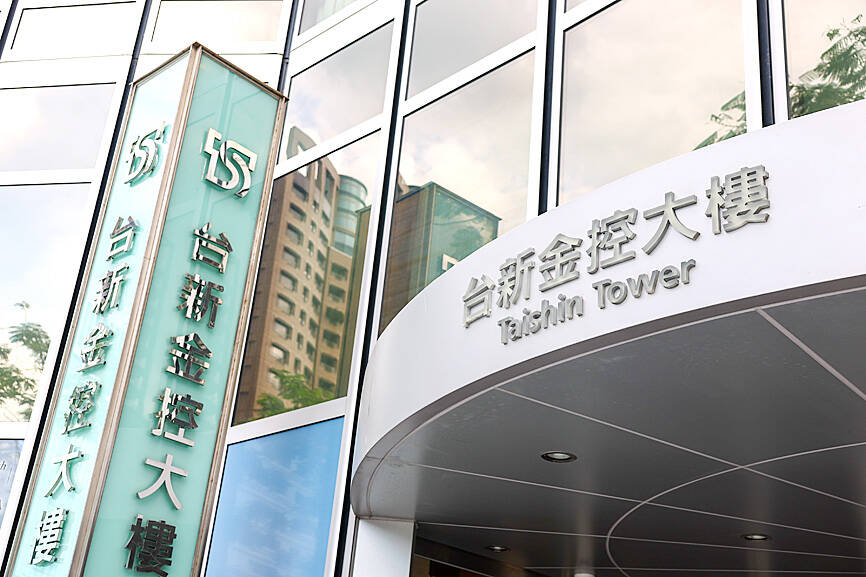Taishin Financial Holding Co (台新金控) yesterday said it is considering adjusting its share swap ratio to compete with CTBC Financial Holding Co’s (中信金控) bid for Shin Kong Financial Holding Co (新光金控).
“The company would make appropriate adjustments to the share swap ratio at an appropriate time,” Taishin Financial president Welch Lin (林維俊) told investors at an earnings conference in Taipei.
Lin’s remarks came as the takeover battle for Shin Kong Financial heats up after CTBC Financial on Friday unveiled the terms of its tender offer.

Photo: CNA
CTBC Financial is offering a share swap ratio of 0.3132 of its shares plus NT$4.09 in cash for each Shin Kong Financial share. Based on CTBC’s closing share price on Friday, that translates into NT$14.55 in cash and stock per share for Shin Kong Financial.
That is better than the NT$11.32 per share offered by Taishin Financial a day earlier: a share swap ratio of 0.6022 of Taishin Financial ordinary shares for each Shin Kong Financial ordinary share, plus a 1:1 swap of their preferred shares.
As CTBC Financial on Monday filed an application with the Financial Supervisory Commission (FSC) for approval of its tender offer bid, Taishin Financial is under growing pressure to sweeten its deal with Shin Kong Financial ahead of the two companies’ respective extraordinary shareholders’ meetings on Oct. 9.
Bid figures change due to fluctuations in the companies’ stock prices, Lin said, but added that Taishin Financial would adjust the share swap ratio if needed.
However, the boards of directors of the two companies would have to repeat the same procedure as on Thursday last week before the share swap ratio can be adjusted, he said.
Taishin Financial also hopes the FSC, which has to respond to CTBC Financial’s application within 15 business days, can support its friendly takeover bid, Lin said.
If the commission approves its rival’s hostile takeover application, it would be unfair to Taishin Financial and pose risks to the domestic financial market, he said.
In the first half of the year, the bank-centric financial conglomerate reported a net income of NT$10.6 billion (US$332 million), up 19.1 percent from NT$8.9 billion a year earlier. It had a book value of NT$13.93 per share, earnings per share of NT$0.74 and return on equity of 11.17 percent.
Taishin International Bank (台新銀行) contributed a net income of NT$8.63 billion in the first half, up 10 percent year-on-year, thanks to an 11.4 percent growth in loans, a 9.8 percent increase in deposits and a 30.6 percent surge in wealth management business, coupled with healthy progress in its credit card business, the company said.
Taishin Financial Holding Co chief financial officer Carol Lai (賴昭吟) said the company expects the central bank to keep interest rates unchanged in the second half of the year, while the US Federal Reserve is likely to cut rates by 0.25 percentage points each next month and in December, which would be beneficial to the company’s foreign currency lending business, Lai added.

Sweeping policy changes under US Secretary of Health and Human Services Robert F. Kennedy Jr are having a chilling effect on vaccine makers as anti-vaccine rhetoric has turned into concrete changes in inoculation schedules and recommendations, investors and executives said. The administration of US President Donald Trump has in the past year upended vaccine recommendations, with the country last month ending its longstanding guidance that all children receive inoculations against flu, hepatitis A and other diseases. The unprecedented changes have led to diminished vaccine usage, hurt the investment case for some biotechs, and created a drag that would likely dent revenues and

Global semiconductor stocks advanced yesterday, as comments by Nvidia Corp chief executive officer Jensen Huang (黃仁勳) at Davos, Switzerland, helped reinforce investor enthusiasm for artificial intelligence (AI). Samsung Electronics Co gained as much as 5 percent to an all-time high, helping drive South Korea’s benchmark KOSPI above 5,000 for the first time. That came after the Philadelphia Semiconductor Index rose more than 3 percent to a fresh record on Wednesday, with a boost from Nvidia. The gains came amid broad risk-on trade after US President Donald Trump withdrew his threat of tariffs on some European nations over backing for Greenland. Huang further

CULPRITS: Factors that affected the slip included falling global crude oil prices, wait-and-see consumer attitudes due to US tariffs and a different Lunar New Year holiday schedule Taiwan’s retail sales ended a nine-year growth streak last year, slipping 0.2 percent from a year earlier as uncertainty over US tariff policies affected demand for durable goods, data released on Friday by the Ministry of Economic Affairs showed. Last year’s retail sales totaled NT$4.84 trillion (US$153.27 billion), down about NT$9.5 billion, or 0.2 percent, from 2024. Despite the decline, the figure was still the second-highest annual sales total on record. Ministry statistics department deputy head Chen Yu-fang (陳玉芳) said sales of cars, motorcycles and related products, which accounted for 17.4 percent of total retail rales last year, fell NT$68.1 billion, or

HSBC Bank Taiwan Ltd (匯豐台灣商銀) and the Taiwan High Prosecutors Office recently signed a memorandum of understanding (MOU) to enhance cooperation on the suspicious transaction analysis mechanism. This landmark agreement makes HSBC the first foreign bank in Taiwan to establish such a partnership with the High Prosecutors Office, underscoring its commitment to active anti-fraud initiatives, financial inclusion, and the “Treating Customers Fairly” principle. Through this deep public-private collaboration, both parties aim to co-create a secure financial ecosystem via early warning detection and precise fraud prevention technologies. At the signing ceremony, HSBC Taiwan CEO and head of banking Adam Chen (陳志堅)